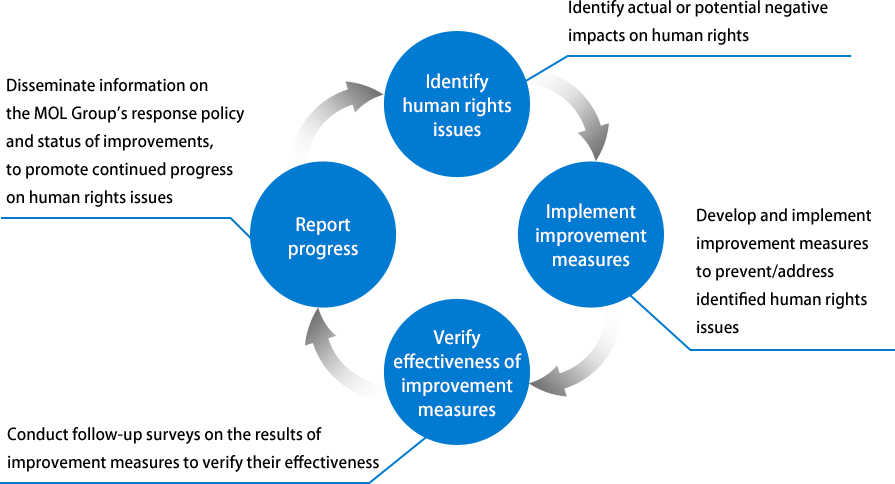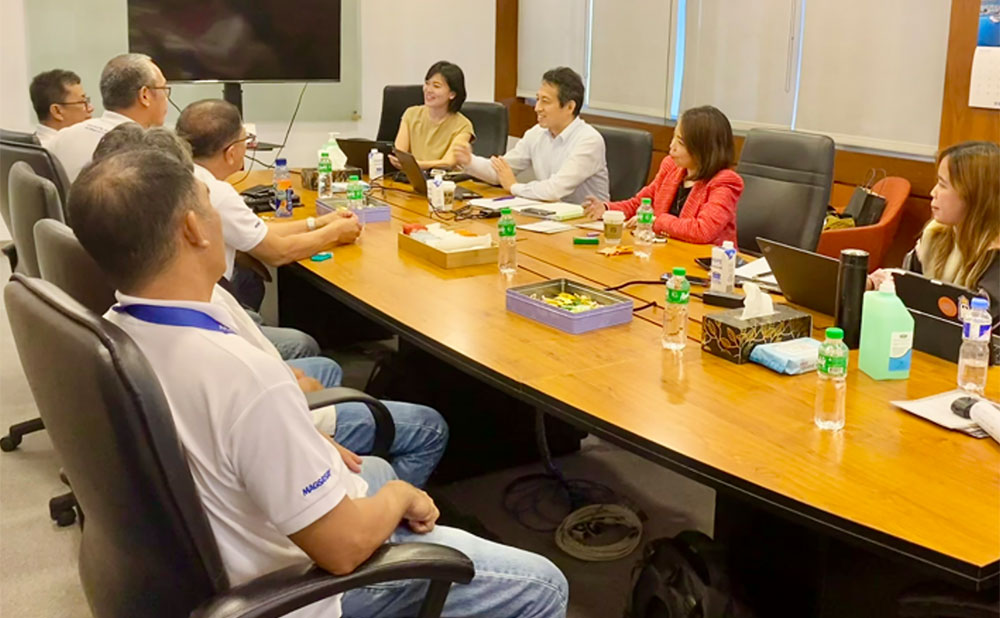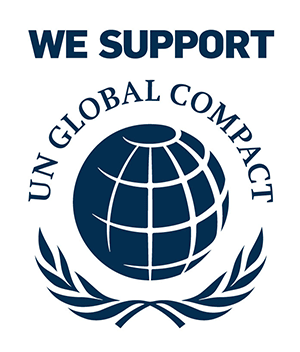- JP
- EN
Human Rights
Policy
Human Rights Policy
The MOL Group issued its Human Rights Policy statement based on the MOL Group Corporate Principles, Group Vision, and Group Values (MOL CHARTS). The group respects human rights in all business activities based on the items stipulated in the policy statement, and contributes to realizing a sustainable global society. The policy statement was approved by the Board of Directors on March 31, 2022, and has since been reviewed and revised, as necessary.
In addition, we work to communicate the MOL Group human rights policy to our business partners and ask them to conduct their business activities in line with human rights concerns. We also established "Suppliers Procurement Guidelines" that include a human rights perspective. For more information on the Suppliers Procurement Guidelines, please refer to the Responsible Procurement page.
System
To promote initiatives to respect human rights, mainly the Sustainability Committee, a subordinate under the Executive Committee, deliberates issues related to human rights. The committee is chaired by the Chief Strategy Officer (CSO) and vice-chaired by the Chief Sustainability Officer (CSuO). As the responsible organization, the Board of Directors also has supervisory responsibility for human rights initiatives. The Corporate Sustainability Division implements specific initiatives in cooperation with other concerned divisions.

Initiatives
Human Rights Due Diligence
Overall view
The MOL Group will establish a human rights due diligence framework based on "the United Nations Guiding Principles on Business and Human Rights," "the International Bill of Human Rights," "the International Labour Organization Declaration on Fundamental Principles and Rights at Work"(it provides for the fundamental rights to work, including freedom of association and the recognition of the right to collective bargaining, the elimination of forced labor, the abolition of child labor, the elimination of discrimination in employment and occupation, and safe and healthy working environment), the OECD Guidelines for Multinational Enterprises, and "the 2006 Convention on Maritime Labour," which stipulates the fundamental right of seafarers to work.
In conducting human rights due diligence, we will proceed with a document-based survey and on-site interviews to grasp the current situation regarding
In our due diligence process conducted before mergers and acquisitions, we assess sustainability-related aspects, including human rights, labor practices, and environmental issues.

Identify Human Rights Issues
Desk Analysis
Starting in FY2022, MOL identifies human rights risks that should be taken into account when conducting the group's business, based on advice from external experts and international indicators including country-specific human rights risks. We also conducted desk analysis with the relevant business division. In the desk analysis, we conducted risk mapping by evaluating both the likelihood and potential impact of human rights risks, taking into account the specific situations of potentially affected stakeholders.
As a result, we have identified "Shipping (Seafarers)", "Logistics" and each potential human rights risks as business fields we will prioritize in future investigations. We will periodically review them, as necessary.
Major human rights risks by identified business field
| Business | Shipping | Logistics |
|---|---|---|
| Main stakeholders that may be affected *1 |
Seafarers | Employees, subcontractors |
| Main human rights risks that may arise *2 |
|
|
- *1 Employees, business partners, local communities, etc. (including employees of business partners, direct and indirect employees, women, children, indigenous peoples, immigrants, etc.) are considered.
- *2 35 items, including forced labor, child labor, human trafficking, harassment and abuse, discrimination, violations of freedom of association and collective bargaining rights, equal pay for equal work, and violations of the rights of indigenous and local people, are considered.
Written Surveys and Interviews
In the "Shipping (Seafarers)" and "Logistics," we conducted written surveys of group companies and interviews with employees to identify key human rights issues.
For the "Shipping (Seafarers)", we identified "working hours," "discrimination and harassment," and "access to remedy" as key human rights issues.
For the "Logistics", we identified "working conditions," "discrimination," "occupational health and safety," and "access to remedy" as key human rights issues.
We plan to conduct periodic review of the human rights risk mapping and key human rights issues.
For more information about MOL Group activities to identify and mitigate sustainability risks, including human rights across the value chain, please visit the Responsible Procurement page.
- <Shipping (Seafarers)>
-
The Maritime Labour Convention, 2006 (MLC 2006), which establishes the fundamental rights of seafarers, also addresses basic human rights such as the elimination of forced labor and the abolition of child labor. Our group is committed to strict compliance with them. For example, our vessels adhere to onboard compliance guidelines, prohibit discrimination by religion, nationality, age, and gender, and establish procedures to address complaints of harassment. They also hold monthly onboard compliance committee meetings to implement and evaluate efforts on human rights issues, discrimination, and harassment through dialogues between crewmembers and onboard compliance officers.
To further promote these initiatives, we conduct human rights due diligence as outlined below.Conducting written surveys and interviews with ship management companies
In the first half of FY2023, we conducted written surveys to comprehensively understand human rights risks across all 11 of our group's in-house ship management companies. Additionally, we conducted interviews with two companies in Japan and one in the Philippines.Conducting direct interviews with seafarers
In the second half of FY2023, we conducted interviews with our group's seafarers. To ensure objectivity and neutrality, we collaborated with third-party experts specializing in business and human rights. We gathered feedback from 28 Japanese seafarers and 60 Filipino seafarers, considering their job types, positions, and hierarchical relationships. By maintaining anonymity and conducting interviews in the local language in the Philippines, we were able to obtain honest and candid opinions. Based on the results of the written surveys from the first half of the year, we discussed topics such as working hours, wages, health and safety, workplace communication, and the use of grievance mechanism, while also checking for risks specific to foreign seafarers.
Interview with seafarers Priority Human Rights Issues
Through this written surveys and interviews conducted, we have identified "working hours," "discrimination and harassment," and "access to remedy" as key areas of human rights issues that should be given more importance.
We are continuing to consider and implement specific measures to further promote initiatives to address existing human rights issues.For more information on other initiatives related to seafarers, please refer to the following pages:
- <Logistics>
-
We conduct human rights due diligence as outlined below.
Conducting written surveys with eight operating companies in Asia
In the first half of FY2023, we conducted written surveys to comprehensively understand human rights risks across eight operating companies in Asia.Conducting value chain desk analysis workshop
In the first half of FY2024, we conducted a desk analysis workshop with employees of MOL Logistics Co., Ltd., who have experience residing abroad to identify the major stakeholders in the logistics business value chain and potential human rights risks.Conducting direct interviews with employees
In the second half of FY2024, we conducted interviews with employees of MOL Logistics (Thailand) Co., Ltd., and its contractors. To ensure objectivity and neutrality, we collaborated with third-party experts specializing in business and human rights. We gathered feedback from 33 employees of MOL Logistics (Thailand) Co., Ltd. and 5 employees of contractors. By maintaining anonymity and conducting interviews in the local language in Thailand, we were able to obtain honest and candid opinions. Based on the results of the written surveys and value chain desk analysis workshop, we discussed topics such as working hours, occupational health and safety, and the use of grievance mechanism.Priority human rights issues
Through these written surveys, desk analysis, and interviews conducted, we have identified "working conditions," "discrimination," "occupational health and safety" and "access to remedy" as key areas of human rights issues that should be given more importance.
We are continuing to consider and implement specific measures to further promote initiatives to address existing human rights issues.
Initiatives for individual human rights issues
Prevention of child labor and forced labor
We do not engage in child labor or forced labor, and carry forward initiatives aimed at preventing such abuses. In particular, in terms of preventing child labor, we conduct recruitment activities in compliance with the Labor Standards Act and thoroughly implement the initiatives by confirming the age of employees by means of ID cards, etc., at the time of hiring. We also believe it is important to educate our employees and provide human rights training programs including education on child labor and forced labor.
In our value chain initiatives, when selecting a ship recycling yard to dismantle an end-of-life ship, we actually conduct on-site interviews and inspections of recycling yards and confirm that they make sufficient efforts to ensure human rights such as eliminating child labor and forced labor.
Initiatives related to wages
The MOL Group ensures compliance with labor laws, including minimum wages in each country where we do business. We have also established a competitive wage structure that not only exceeds national and local minimum wage levels, but also guarantees a living wage allowing employees to work with peace of mind, and is necessary to secure highly qualified personnel.
Furthermore, we apply a unified compensation system for the same qualifications and the same job level.
Actions on LGBTQ issues
We strive to create a comfortable working environment for LGBTQ (sexual minorities). We provide training programs to prevent unintentional harassment due to discrimination or lack of understanding, and renovations are underway at the Head Office to build more LGBTQ-friendly facilities.
Reduction of Overtime Work
The MOL Group strives to optimize working hours from the perspective of preventing physical and mental health problems among employees.
For more information on our measures, please see the section "Health and Productivity Management: Reduction of Overtime Working Hours." We have taken various measures to reduce overtime work.
Harassment Prevention
The MOL Group is undertaking initiatives to prevent any kind of workplace harassment, since this is detrimental to mutual respect. Besides training related to the prevention of harassment, we have formulated a Group declaration on harassment prevention that expresses our non-tolerance of such forms of behavior. We are redoubling our efforts to create harassment-free workplaces.
- MOL Group Declaration of Harassment Prevention
-
The Mitsui O.S.K. Lines Group will take the following measures to promote the creation of healthy and dynamic workplaces free from harassment.
- We will foster an organizational culture in which each and every employee on land and at sea, will respect each other regardless of position and will be able to freely and energetically demonstrate diverse individuality, values, and viewpoints.
- Employees and the Company will work together to build an organizational culture that enhances knowledge and awareness of harassment prevention and deters or stops any form of harassment.
- We shall establish a system in which anyone can feel safe about reporting harassment issues, and in the event of harassment, we shall take fair and appropriate measures in a resolute manner and establish an organizational structure to prevent recurrence.
Established in December 2020
Access to Remedy
The MOL Group provides several advisory and reporting service desks to promptly address human rights-related concerns.
The group is also a regular member of the Japan Center for Engagement and Remedy on Business and Human Rights (JaCER), which supports effective grievance handling in compliance with the UN Guiding Principles on Business and Human Rights. The "Dialogue Remedy Platform" provided by JaCER accepts a wide range of human rights-related complaints and reports from all external stakeholders, including customers and business partners in the group value chain. In receiving reports, we will ensure the anonymity of whistleblowers and the confidentiality of the content of reports. We will ensure the legitimacy of complaint handling and respond appropriately with fairness and transparency by accepting complaints through a third party in a professional position. We will also analyze the factors and frequency of cases received and endeavor to prevent and mitigate future human rights risks by reflecting the results as necessary in our human rights due diligence, which is promoted under the supervision and direction of the Sustainability Committee.
Information on the progress of the case will be disclosed anonymously on the JaCER website regularly.
List of Advisory and Report Service Desks
| Target | Advisory and Report Service Desks | Details of Consultations/Reports Received |
|---|---|---|
| For group executives and employees (including temporary and contract employees) | Compliance Officer (internal) |
|
| Compliance advisory service desk (internal/external) |
||
| Harassment advisory service desk (internal/external) |
|
|
| For external stakeholders such as customers and business partners | Compliance advisory service desk (internal/external) * Click here to contact us. |
|
| Human rights advisory service desk (external) * Click here to contact us. |
|
For details on JaCER, please click here.
Click here to learn more about the MOL Group’s compliance activities.
Human rights Education
MOL holds human rights and harassment prevention training programs every year. These programs are designed to provide a deeper understanding of not only legal compliance related to human rights and harassment of course, but also relevant systems and actual events including background issues, such as how people are affected by human rights abuses and harassment, with the aim of creating a foundation for responsible actions by all MOL Group employees. In addition, these programs are intended to help employees act as good citizens, not only in corporate activities, but also in their everyday lives.
Human rights training programs
Online training programs help all MOL Group executives and employees in Japan and overseas understand the importance of our initiatives to respect human rights (participation rate in FY2024 : 96.2%). Besides giving staff a deeper understanding of the fundamental human rights risks that can arise in businesses within the MOL Group value chain, such as forced and child labor, the programs aim to underline the Group's commitment to enforcing our human rights policy.
For the performance of e-learning participation rates, please refer to the Sustainability Data Collection page.
In addition, we provide rank-specific training programs for managers, general employees, and new employees to prevent various human rights violations.
Harassment prevention training programs
We conduct training programs for staff in both managerial and non-managerial roles that are designed to prevent harassment to ensure workplaces across the entire MOL Group are harassment-free and to cultivate a work culture that reassures and supports everybody.
In particular, we have tried to make managerial training more effective by adding content relating to anti-harassment laws; distinguishing between guidance and power-based harassment; and the risks of not tackling workplace harassment. We also organize group training sessions to look at actual examples of harassment in the workplace and consider responses to it.
Dialogue with stakeholders
Participating in the 2024 Stakeholder Engagement Program
MOL participated in eight stakeholder engagement programs from June 7 to August 7, 2024, sponsored by the non-profit organization Japan Committee of the Caux Round Table.
The program is designed to discuss a wide range of human rights issues with companies from various industries, NPOs and NGOs, academics, and experts, to provide opportunities for companies to understand and put into practice the UN Guiding Principles on Business and Human Rights.
The discussions in FY2024, which were not specific to certain industrial sectors, looked at developments in supply chain laws and regulations related to business and human rights in Japan and abroad, labor issues in overseas supply chains and Japanese companies, and issues raised by civil society regarding climate change and the green economy. These discussions included the impact on businesses and related responses.
With transportation and logistics companies participating in the program, we worked to identify "key human rights issues for each industry" using a tool developed by the United Nations Environment Programme Finance Initiative (UNEP FI) to deepen their understanding of human rights issues in transportation and logistics.
See below for the final report.
Stakeholder Engagement Program Final Report
[Human Rights Issues by Sector v.13]
Support for International Initiatives
Participating in the UN Global Compact

With business activities spread across the globe, the MOL Group believes that building good relationships with various stakeholders worldwide and contributing to the realization of sustainable growth of society are vital as it seeks to realize the ideas set forth in the MOL Group Corporate Principles. In order to contribute to an international framework for realizing these goals, MOL became the first Japanese shipping company to participate in the United Nations Global Compact in 2005.
Since then, MOL has worked to support and practice the 10 principles in 4 areas of the UN Global Compact, which shares the same values as MOL's Rules of Conduct, which were established as a set of guidelines for executives and employees.
Modern Slavery Statement
As part of our efforts to eliminate any form of forced labor, modern slavery or human trafficking within our business and the MOL Group value chain, we publish a "Modern Slavery Statement" on our website in line with the UK Modern Slavery Act 2015.
- Sustainability TOP
- Message from the Chief Sustainability Officer
- Sustainability
Management - Value Creation
Stories - Safety & Value
- Environment
- Human & Community
- Innovation
- Governance
- Stakeholder
Engagement - Sustainable Finance
- Sustainability Data
- ESG Disclosure
Guideline Indexes - External Recognition
- Library



